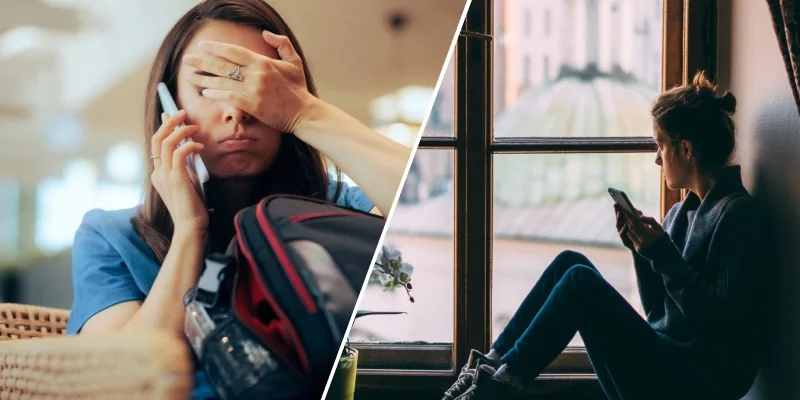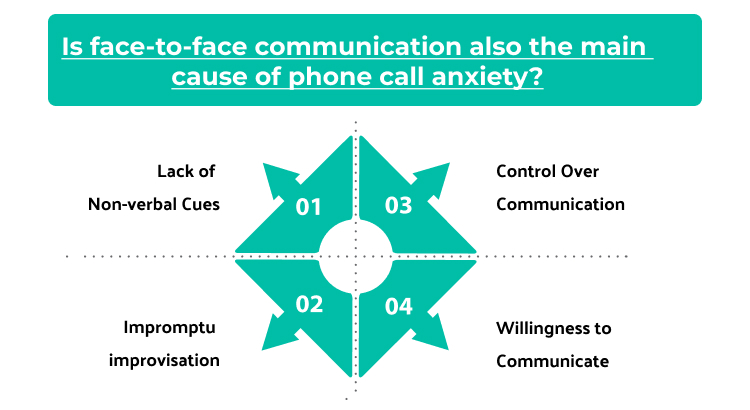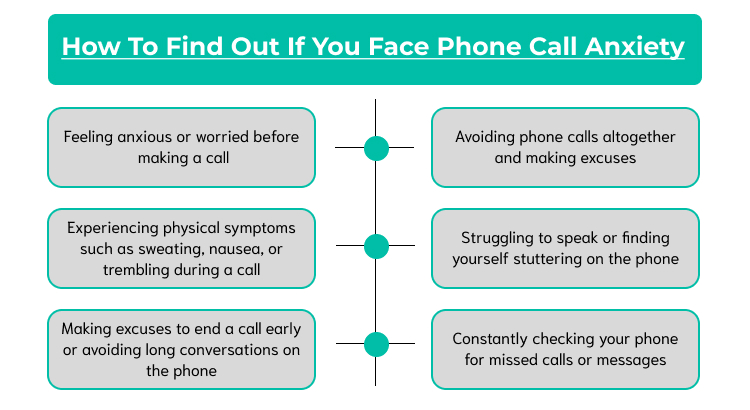
What is Phone Call Anxiety? Why You Face Phone Call Anxiety

Do you ever feel like you’re being judged every time you make a phone call? Have you caught yourself making excuses just to avoid answering calls? When you reach out to a friend or family member, do you secretly hope they won’t pick up? If so, my friend, you may be experiencing phone call anxiety.
You may feel that you’re alone in this struggle, but the truth is, that phone call anxiety is a common phobia that affects many people. Also known as telephonophobia or telephone avoidance disorder, it is the fear of making or receiving phone calls. This type of anxiety can stem from social anxiety disorder, agoraphobia (fear of being in public places), past traumatic experiences, or simply the fear of not knowing what to say.
But with the right guidance, you can learn to manage and overcome this fear. So, let’s dive into the world of phone call anxiety and find out why it occurs.
What is Phone Call Anxiety?
Phone call anxiety is a type of social anxiety that manifests specifically when making or receiving phone calls. It can cause intense feelings of fear, panic, stress, and avoidance. People who experience this type of anxiety mostly avoid making calls on the phone. Studies have also revealed that people who have anxiety about talking on the phone prefer text messaging.
Is face-to-face communication also the main cause of phone call anxiety?
Phone call anxiety, or telephobia, is often linked to social anxiety disorder, and several factors and characteristics are distinguishing it from face-to-face communication. Here are some key points regarding the relationship between face-to-face communication and phone call anxiety:

Lack of Non-verbal Cues: Unlike face-to-face communication, phone calls lack visual cues such as facial expressions, gestures, and body language which can make communication more challenging for some individuals. People might feel more anxious during phone calls as they can’t gauge the other person’s reactions or emotions as easily as they can in face-to-face interactions
Improvisation: Phone calls might require more improvisation as compared to face-to-face interactions. The inability to navigate silences or react to visual cues might cause individuals to feel anxious as they have to think on their feet without having the additional context provided by visual cues1.
Control Over Communication: In texting or emailing, individuals have more control over what they want to say, and they can plan their responses. However, phone calls require immediate responses which might induce anxiety in some individuals2.
Willingness to Communicate: Research suggests that anxiety can negatively impact an individual’s willingness to engage in face-to-face communication. In some cases, people might find it easier to communicate through phone calls or text messages as it might be less anxiety-inducing than face-to-face communication.
How Does Phone Anxiety Comes?
Telephobia or phone call anxiety can be triggered by various factors or a combination of the following if you are facing these factors, you are the one who is facing phone call anxiety
You Can't Pick Verbal Cues on the Phone
As mentioned earlier, phone calls lack visual cues which can make communication more challenging for some individuals. People with phone call anxiety might struggle to pick up verbal cues such as tone or pitch of voice over the phone. This can lead to misunderstanding and confusion, causing them to feel anxious.
The pressure of Getting Judged
Words are not just words; they carry a lot of weight. When you’re on the phone, there is no way to hide your emotions or reactions behind a screen. This can make people feel vulnerable and exposed, especially if they are already struggling with self-esteem issues or anxiety. You can;t delete the words from your phone call conversation, which can cause people to feel anxious about being judged by the other person.
Negative Past Experiences
Like any form of anxiety, phone call anxiety can also be triggered by past traumatic experiences. If you’ve had a bad experience with phone calls in the past, such as getting yelled at or receiving bad news over the phone, it can create a negative association and fear of similar situations.
Meet Our Mental Health Expert & Get Personalized Care
Fear of Not Knowing What to Say
Phone calls require individuals to think on their feet, which can be challenging for people with anxiety. The fear of not knowing what to say or stumbling over words can cause them to avoid phone calls altogether. This fear can also be related to social anxiety, where individuals are afraid of saying something embarrassing or awkward.
How To Find Out If You Face Phone Call Anxiety

If you’re unsure about whether or not you have phone call anxiety, here are some signs to look out for:
- Feeling anxious or worried before making a call
- Avoiding phone calls altogether and making excuses
- Experiencing physical symptoms such as sweating, nausea, or trembling during a call
- Struggling to speak or finding yourself stuttering on the phone
- Making excuses to end a call early or avoiding long conversations on the phone
- Constantly checking your phone for missed calls or messages
If you resonate with any of these signs, then it may be worth exploring your feelings towards phone calls and seeking help to manage your anxiety.
How To Get Over Phone Call Anxiety?
Phone call anxiety can impact daily life by causing individuals to avoid important calls or miss out on opportunities. Therefore, it is essential to learn how to manage and overcome this fear. Here are some tips that can help you get over phone call anxiety.
1. Answer the Calls
The best way to get over some thing is to face it. So, instead of ignoring or avoiding phone calls, try to answer them. It may feel overwhelming at first, but with practice, it will become easier.
2- Prepare Yourself
Before making a call, take a few moments to gather your thoughts and plan what you want to say. You can also jot down some key points if it helps you feel more prepared. Having a plan can help reduce anxiety and give you a sense of control over the conversation.
3- Practice Deep Breathing
Deep breathing is a proven technique to manage anxiety and calm the mind. Before making or answering a call, take a few deep breaths to relax your body and mind.
4- Don't Overthink
As someone with anxiety, it’s natural to overthink and imagine worst-case scenarios. Instead of dwelling on the what-ifs, try to focus on the present moment and remind yourself that you are capable of handling any situation.
5- Acknowledge Your Self-Accomplishments
Every time you successfully make or answer a call, give yourself credit for it. Overcoming phone call anxiety takes time and effort, so don’t forget to acknowledge your progress.
6- Go For Voicemail If the Call is Not Answered
If you’re unable to answer a call, don’t panic. Let the call go to voicemail and give yourself some time to gather your thoughts before returning the call.
7- Retreats and Meditation
Retreats and meditation can help you relax, reduce anxiety, and improve your overall well-being. Consider joining a retreat for anxiety or incorporating meditation into your daily routine to manage phone call anxiety.
Conclusion
Phone call anxiety is a common form of social anxiety that can impact an individual’s daily life. It can be triggered by various factors such as the lack of visual cues, fear of being judged, negative past experiences, and the pressure of coming up with instant responses. However, it is possible to manage and overcome phone call anxiety with practice and patience.
Remember to be kind to yourself and seek help if needed. With time and effort, you can learn to communicate confidently over the phone without feeling anxious. So don’t let phone call anxiety hold you back from connecting with others and reaching your goals. Let’s work towards managing and overcoming our anxieties, one phone call at a time. So go ahead, pick up that phone, and conquer your fears!
For more information and guidance on how to get the right mental health medication, Get in touch with the specialized psychiatrist now!

About Author
As an Adult Psychiatrist, I bring a wealth of experience to my practice, specializing in the evaluation and treatment of mental and psychiatric disorders. My holistic approach encompasses a wide range of therapeutic techniques, including biological, psychotherapeutic, and psychosocial interventions, all designed to address the unique needs of each patient.
Our Services
Recent Post

About Author
Swati Ellendula, M.D.
As an Adult Psychiatrist, I bring a wealth of experience to my practice, specializing in the evaluation and treatment of mental and psychiatric disorders. My holistic approach encompasses a wide range of therapeutic techniques, including biological, psychotherapeutic, and psychosocial interventions, all designed to address the unique needs of each patient.
Schedule Your Consultation Today
Take the first step towards improved mental well-being. Schedule your consultation with us now.



